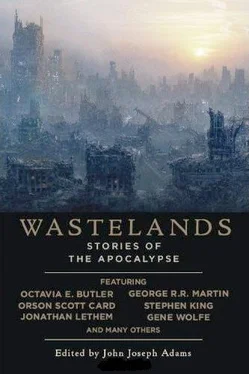"That means no more hot food," she told her brother. "It’s electric. My stove is."
"They’ll come back on," he said confidently, but they did not.
That night she undressed in the dark bedroom they had made their own, in the lightless house, folding clothes she could not see and laying them as neatly as her fingers could manage upon an invisible chair before slipping between the sheets.
Warm and naked, her brother followed her half a minute later. "You know, Jelly," he said as he drew her to him, "we’re probably the only live people in the whole world."
Nancy Kress is the author of 14 science fiction or fantasy novels, and more than 80 short stories, which have been collected in Trinity and Other Stories, The Aliens of Earth , and Beaker’s Dozen . Her novella, “Beggars in Spain,” which was later expanded into a novel, won both the Hugo and Nebula Awards. She received the Nebula Award twice more, once for her story “Out of All Them Bright Stars,” and again for “The Flowers of Aulit Prison,” which also won the Theodore Sturgeon Memorial Award. In 2003, Kress won the John W. Campbell Memorial Award for her novel Probability Space .
In 2007 and 2008, Kress will have three new books out: a new story collection from Golden Gryphon Press, a new SF novel, Steal Across the Sky , and an SF thriller, Dogs , which, like the story included here, involves a highly communicable plague.
“Inertia” tells the story of the victims of a disfiguring epidemic who are interned in the modern equivalent of leper colonies. Kress says that identity—who you are, why you’re here, why you are who you are (and what you are supposed to be doing about it)—is a central idea in her work, and this story is no exception.
At dusk the back of the bedroom falls off. One minute it’s a wall, exposed studs and cracked blue drywall, and the next it’s snapped-off two-by-fours and an irregular fence as high as my waist, the edges both jagged and furry, as if they were covered with powder. Through the hole a sickly tree pokes upward in the narrow space between the back of our barracks and the back of a barracks in E Block. I try to get out of bed for a closer look, but today my arthritis is too bad, which is why I’m in bed in the first place. Rachel rushes into the bedroom.
“What happened, Gram? Are you all right?”
I nod and point. Rachel bends into the hole, her hair haloed by California twilight. The bedroom is hers, too; her mattress lies stored under my scarred four-poster.
“Termites! Damn. I didn’t know we had them. You sure you’ re all right?”
“I’m fine. I was all the way across the room, honey. I’m fine.”
“Well—we’ll have to get Mom to get somebody to fix it.”
I say nothing. Rachel straightens, throws me a quick glance, looks away. Still I say nothing about Mamie, but in a sudden flicker from my oil lamp I look directly at Rachel, just because she is so good to look at. Not pretty, not even here Inside, although so far the disease has affected only the left side of her face. The ridge of thickened, ropy skin, coarse as old hemp, isn’t visible at all when she stands in right profile. But her nose is large, her eyebrows heavy and low, her chin a bony knob. An honest nose, expressive brows, direct gray eyes, chin that juts forward when she tilts her head in intelligent listening—to a grandmother’s eye, Rachel is good to look at. They wouldn’t think so, Outside. But they would be wrong.
Rachel says, “Maybe I could trade a lottery card for more drywall and nails, and patch it myself.”
“The termites will still be there.”
“Well, yes, but we have to do something.” I don’t contradict her. She is sixteen years old. “Feel that air coming in—you’ll freeze at night this time of year. It’ll be terrible for your arthritis. Come in the kitchen now, Gram—I’ve built up the fire.”
She helps me into the kitchen, where the metal wood-burning stove throws a rosy warmth that feels good on my joints. The stove was donated to the colony a year ago by who-knows-what charity or special interest group for, I suppose, whatever tax breaks still hold for that sort of thing. If any do. Rachel tells me that we still get newspapers, and once or twice I’ve wrapped vegetables from our patch in some fairly new-looking ones. She even says that the young Stevenson boy works a donated computer news net in the Block J community hall, but I no longer follow Outside tax regulations. Nor do I ask why Mamie was the one to get the wood-burning stove when it wasn’t a lottery month.
The light from the stove is stronger than the oil flame in the bedroom; I see that beneath her concern for our dead bedroom wall, Rachel’s face is flushed with excitement. Her young skin glows right from intelligent chin to the ropy ridge of disease, which of course never changes color. I smile at her. Sixteen is so easy to excite. A new hair ribbon from the donations repository, a glance from a boy, a secret with her cousin Jennie.
“Gram,” she says, kneeling beside my chair, her hands restless on the battered wooden arm, “Gram—there’s a visitor. From Outside. Jennie saw him.”
I go on smiling. Rachel—nor Jennie, either—can’t remember when disease colonies had lots of visitors. First bulky figures in contamination suits, then a few years later, sleeker figures in the sani-suits that took their place. People were still being interred from Outside, and for years the checkpoints at the Rim had traffic flowing both ways. But of course Rachel doesn’t remember all that; she wasn’t born. Mamie was only twelve when we were interred here. To Rachel, a visitor might well be a great event. I put out one hand and stroke her hair.
“Jennie said he wants to talk to the oldest people in the colony, the ones who were brought here with the disease. Hal Stevenson told her.”
“Did he, sweetheart?” Her hair is soft and silky. Mamie’s hair had been the same at Rachel’s age.
“He might want to talk to you!”
“Well , here I am.”
“But aren’t you excited? What do you suppose he wants?”
I’m saved from answering her because Mamie comes in, her boyfriend Peter Malone following with a string-bag of groceries from the repository.
At the first sound of the doorknob turning, Rachel gets up from beside my chair and pokes at the fire. Her face goes completely blank, although I know that part is only temporary. Mamie cries, “Here we are!” in her high, doll-baby voice, cold air from the hall swirling around her like bright water. “Mama darling—how are you feeling? And Rachel! You’ll never guess—Pete had extra depository cards and he got us some chicken! I’m going to make a stew!”
“The back wall fell off the bedroom,” Rachel says flatly. She doesn’t look at Peter with his string-crossed chicken, but I do. He grins his patient, wolfish grin. I guess that he won the depository cards at poker. His fingernails are dirty. The part of the newspaper I can see says ESIDENT CONFISCATES C.
Mamie says, “What do you mean, ‘fell off?’”
Rachel shrugs. “Just fell off. Termites.”
Mamie looks helplessly at Peter, whose grin widens. I can see how it will be: They will have a scene later, not completely for our benefit, although it will take place in the kitchen for us to watch. Mamie will beg prettily for Peter to fix the wall. He will demur, grinning. She will offer various smirking hints about barter, each hint becoming more explicit. He will agree to fix the wall. Rachel and I, having no other warm room to go to, will watch the fire or the floor or our shoes until Mamie and Peter retire ostentatiously to her room. It’s the ostentation that embarrasses us. Mamie has always needed witnesses to her desirability.
Читать дальше












